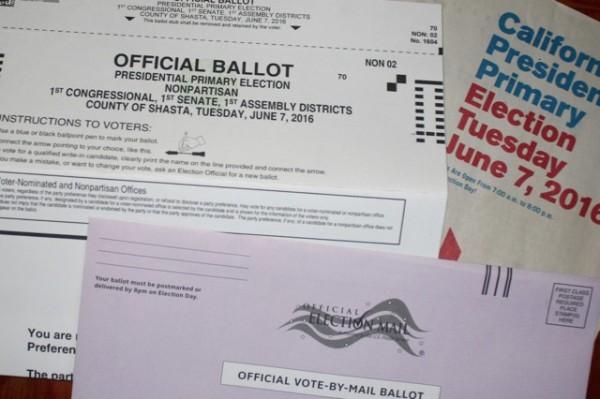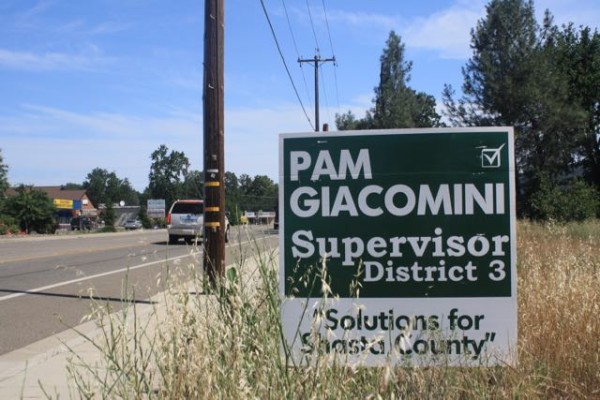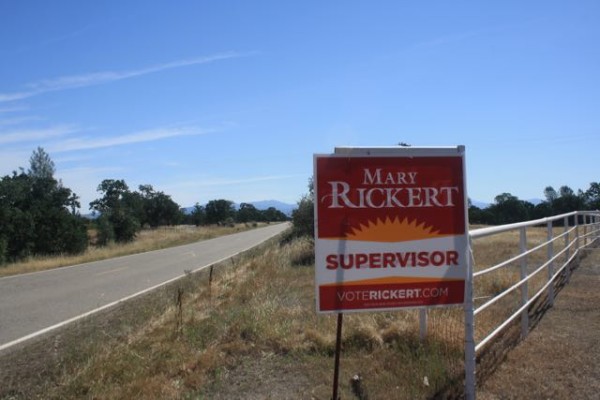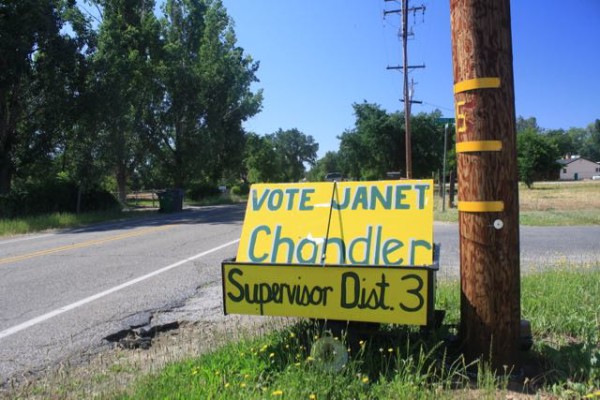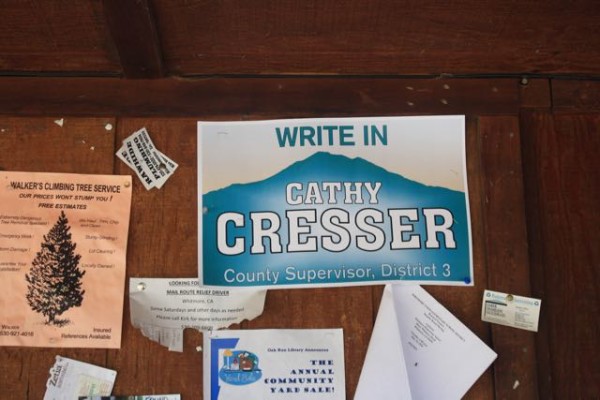Lately I’ve been having to pinch myself to make sure I’m conscious and not trapped in some sort of waking hillbilly nightmare. Mostly I blame National Review writer Kevin D. Williamson for this. As the conservative publication’s roving correspondent, he’s been making a career of late deconstructing the decline of the white working class, pointing the finger of blame for the decline straight back at the Great White Ghetto.
That’s Williamson’s term for working class communities outside the Beltway and the coastal cities still reeling from the Great Recession. Silicon Valley’s doing swell, but northern California’s just an extension of the Great White Ghetto. In a condescending polemic launched against Donald Trump supporters in National Review’s March issue, Williamson could conceivably be referring to Shasta County when he writes:
“If you spend time in hardscrabble, white upstate New York, or eastern Kentucky, or my own native West Texas, and you take an honest look at the welfare dependency, the drug and alcohol addiction, the family anarchy — which is to say, the whelping of human children with all the respect and wisdom of a stray dog — you will come to an awful realization. It wasn’t Beijing. It wasn’t even Washington, as bad as Washington can be. It wasn’t immigrants from Mexico, excessive and problematic as our current immigration levels are. It wasn’t any of that.”
Well, what was it then? Williamson explains:
“The white American underclass is in thrall to a vicious, selfish culture whose main products are misery and used heroin needles. Donald Trump’s speeches make them feel good. So does OxyContin. What they need isn’t analgesics, literal or political. They need real opportunity, which means that they need real change, which means that they need U-Haul.”
Harsh words, but they ring true enough to anyone who regularly reads the Shasta County Sheriff’s daily logbook. I live in District 3, which includes the villages of Round Mountain, Burney, Oak Run, Palo Cedro and Whitmore. We’ve got all the aforementioned problems here and then some. We’ve also got plenty of space between those problems. I can hear my neighbor’s rooster crow every morning, but it’s too far away for me to shoot. I know plenty of people on food stamps but don’t know anyone who does Oxy or meth. It may not be quite as bad as Williamson would have us believe.
Not that we’re in denial. Shasta County has been aware of these problems far longer than Williamson has been on the beat, as the four candidates running for District 3 county supervisor in Tuesday’s primary election demonstrate. As far as I can tell, no candidate is promising U-Haul as “real change.” The idea is sort of to get people to stay here.
I’ve previously met current District 3 supervisor Pam Giacomini at her family’s grass-fed cattle ranch in Hat Creek. She’s arguably been county government’s biggest booster for bringing broadband internet to the boondocks and proved adept at aiding her constituents during and after the massive Eiler fire. Mayer’s Memorial Hospital stayed open and the Sheriff’s Burney substation was reopened on her watch. By all accounts Giacomini has acquitted herself well.
Like Giacomini, challenger Mary Rickert hails from a cattle ranching family. Cattle ranching is a tough business, but improving public safety is the primary concern listed by both candidates, no doubt inspired by the human flotsam and jetsam that has continued to wash ashore in Shasta County since the real estate bubble burst. Rickert’s 10 years of service on the Shasta County Mental Health and Drug and Alcohol Board may give her an edge dealing with transient issues.
“With prevention and early intervention, we can effectively reduce homelessness, especially due to mental illness and substance abuse in Shasta County,” Rickert explains in a campaign brochure. “A comprehensive solution combining improved mental health services, housing options, and detox facilities must be planned and implemented as soon as possible.”
The third candidate on the ballot, Burney resident Janet Chandler, is an educator who claims her family’s agricultural business was destroyed by high county taxes, forcing family members to leave the area. Chandler wants them back.
“I want to create a county, state and environment that provides a viable economy to provide jobs and opportunities for our most precious and valuable resources: our children,” she explains. “Both of my sons and their families have left the north state for areas where there are jobs available, despite the fact that both of them have earned Master’s Degrees.”
Chandler wants to bring agriculture back to Shasta County as a way of life, but doesn’t state what measures she’d enact to accomplish this. She supports the State of Jefferson, the quixotic political movement seeking to carve a 51st state out of northern California and southern Oregon. There’s a sizable SOJ contingent in Shasta County, which could make Chandler a spoiler candidate, preventing Giacomini or Rickert from receiving 50 percent of the vote and forcing a run-off election in November.
Write-in candidate Cathy Cresser, an organic farmer from Oak Run, has a solution to bring agriculture back to Shasta County: Overhaul Measure A, the initiative passed by voters in 2014 that prohibited the outdoor cultivation of medical marijuana in Shasta County and severely limited indoor growing. She has a point. We have the best outdoor growing territory in the state. If voters choose to legalize recreational marijuana in November, Shasta County will be behind the curve, forgoing a valuable revenue source.
As Williamson notes, white working class communities are in dire need of real economic opportunity. Currently, outdoor marijuana cultivation is not an option in Shasta County, but that could change if the state’s voters legalize recreational marijuana in the fall. At a candidates forum in Palo Cedro last month, Giacomini indicated some flexibility on the issue.
“If a recreational law passes, then we have to revisit the idea,” she said. “I’m an agriculture producer. I have to account for all of my water and pesticides and runoff. That needs to apply to marijuana producers as well, if the time comes.”
At the same forum, Cresser stressed that Measure A needs to be addressed now.
That the hour is urgent is evidenced by the populist fervor whipping across the United States, fomented by the angry white working class voters maligned by Williamson and championed by anti-establishment candidates Sen. Bernie Sanders and billionaire real estate developer and reality TV show star Donald Trump.
Both candidates passed through the north state last week and received enthusiastic receptions, Sanders delivering his rousing campaign stump speech in Chico and Trump holding a small but raucous rally on the hot tarmac at the Redding Municipal Airport. Their style and demeanor couldn’t be more different, particularly Trump’s sometimes vulgar remarks on illegal immigration, but underneath the theatrics and rhetoric, the message is the same: It’s time to make government work for everyone, not just the donor class.
That this message resonates with voters is validated by the fact that tomorrow’s California presidential primary election matters for the first time in ages. Sanders has narrowed the gap to Hillary Clinton and is poised for an upset victory that could lead to a contested Democratic convention in Philadelphia this July. Trump is already the presumptive Republican nominee, but another record-breaking primary voter turnout will bolster his claim as leader of the populist wave sweeping the country. Beltway pundits will be staying up past their bedtimes Tuesday night.
When historians begin unraveling the mystery of how Republicans lost control of their own party to a rogue, uncouth outsider in the 2016 presidential primary contest, the writings of Kevin D. Williamson in the National Review, the conservative establishment’s house organ, will provide a great place to start. They might begin with Williamson’s fatal prescription for the problems plaguing small town America:
“There is more to life in the 21st century than wallboard and cheap sentimentality about how the Man closed the factories down. The truth about these dysfunctional, downscale communities is that they deserve to die. Economically, they are negative assets. Morally, they are indefensible.”
So much for our four earnest candidates running for supervisor, family women with strong community ties seeking to make Shasta County District 3 a better place to live. Why even bother voting? Just call U-Haul.
Reading Williamson, I couldn’t help recalling a political maxim I first encountered in the early 1990s: Don’t vote, it only encourages them. The slogan was printed across the top of a paper grocery sack with accompanying text beneath. The “bagitorial” turned out to be the brainchild of John and Ned Roscoe, the father-and-son team who at the time owned-and-operated the highly lucrative Cigarettes Cheaper! empire.
Hardcore libertarians, the Roscoes had cornered the market on discount cigarettes and quickly expanded into groceries and gasoline. The California-based company’s name was its business model. Before it crashed-and-burned in the early 2000s, the company controlled more than 800 convenience stores and gas stations across the country and was valued at $1 billion.
Father and son weren’t shy about expressing their tax-averse, anti-government views in public and libertarianism became part-and-parcel of the Cheaper! brand. When they began printing incendiary quasi-seditious screeds urging citizens not to vote on their grocery bags, media from the Wall Street Journal on down to me took notice.
I had several spirited conversations with Ned Roscoe on the topic of not voting. Well-educated with a head for facts, he nevertheless parroted the same libertarian mantra embraced by Republican and Democratic administrations from GHW Bush to Barrack Obama: free markets, open borders, government deregulation. Such policies have of course greatly enriched corporate shareholders—the donor class—at the expense of entire working class communities for decades now.
That’s where the Great White Ghetto came from.
As I recall, Roscoe maintained that government doesn’t create anything of value, therefore there is no real demand for government services, with the possible exception of national self defense and local police forces. Anything the government can do, the private sector can do better, and if the private sector isn’t doing it, perhaps it shouldn’t be done. If we stopped voting people into office, government would become unnecessary and simply fade away.
It was an interesting theory, but I didn’t buy it. The right to vote is the cornerstone of a democratic society. If you don’t exercise that right, you forfeit any right to complain about the results. Period.
Flash forward 20 years or so, and I’m living in eastern Shasta County woods, and Ned’s doing the last few months of a five-year prison term for bank fraud. That’s not to say I won the argument. Judging by the general decline in U.S. voter turnout during the past several decades, particularly in midterm and primary elections, it’s fair to say increasingly more people have opted out of voting.
But contrary to Roscoe’s theory, government hasn’t dried up and blown away. If anything it’s grown larger, more incompetent and more corrupt, to the point where a populist backlash became inevitable. All it took was one candidate to remind us we have the power to make America great again. Tomorrow, it’s time to utilize that power.
Vote.

